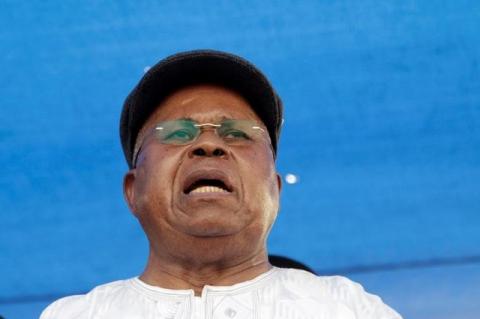Advertisement
Return of Congo's Tshisekedi jolts opposition to life
KINSHASA (Reuters) - In 1991, then Congolese President Mobutu Sese Seko made his long-time nemesis Etienne Tshisekedi prime minister, hoping to neutralize opposition to a dictatorship beset by economic and political crises.
But Tshisekedi's irascibility meant he couldn't resist taking a swipe at his foe: at his swearing-in ceremony, he omitted a reference to Mobutu as "guarantor of the nation" from the oath of office, and was fired five days later.
Twenty-five years on and the 83-year-old is the mainstay of Democratic Republic of Congo's opposition, and once again a thorn in the side of power, following a triumphant return to Kinshasa late last month.
After two years spent abroad for unspecified medical treatment, Tshisekedi instantly reinvigorated a moribund opposition campaign demanding President Joseph Kabila step down when his mandate expires in December.
Anti-Kabila demonstrations in Kinshasa over the last two years had failed to mobilize more than a few thousand people, yet many tens of thousands lined the streets for Tshisekedi's homecoming and again for a speech last Sunday.
"That's Tshisekedi's trademark," said Albert Moleka, his chief of staff from 2011 to 2014. "He has always held the crowds in his thrall."
His return already appears to have had an effect on the balance of power; perhaps mindful of his popularity, the government has desisted from cracking down on demonstrations by force - both of the mass gatherings he attended last week passed off peacefully without any intervention from security forces.
By contrast, rallies organized by less prominent opposition leaders over the past two years have regularly been dispersed by police firing teargas and arresting activists.
The government said security forces intervened because the demonstrations were a threat to public order and constituted an incitement to revolt. Opposition politicians say they were a peaceful form of democratic protest.
RISK OF CONFLICT
In power since his father was assassinated in 2001, Kabila beat Tshisekedi in a 2011 election that international observers said was marred by fraud - a charge denied by the government.
Term limits bar Kabila from contesting polls that are scheduled for Nov. 27 but are now almost certain to be delayed. The government says logistical and budgetary constraints make it unrealistic to hold the election on time; Kabila's opponents accuse him of delaying to cling to power.
If the opposition agrees to the president's call for a "national dialogue" on a new timetable for elections, the reappearance of Tshisekedi and the popular support he commands could increase the pressure on Kabila to make concessions, say political analysts.
The spokesman for Tshisekedi's UDPS party, Bruno Tshibala, said Tshisekedi hoped that dialogue could ensure orderly, peaceful elections by the end of the year.
Government spokesman Lambert Mende said insisting on elections this year was irresponsible as the country's voter rolls currently exclude millions of eligible voters.
The government says Kabila will remain in power until a new president is elected, but opposition politicians want him to leave at the end of his term - regardless of election timing - and be replaced by the head of the Senate. Short of that, they want Kabila to set a firm date for his departure.
A failure of the opposing sides to reach an agreement on the timing of elections and Kabila's departure risks a resurgence of the unrest and armed conflict that has sporadically plagued Congo - Africa's biggest copper producer - since Mobutu was overthrown two decades ago.
'THE SPHINX'
At a rally in Kinshasa last Sunday, Tshisekedi told tens of thousands of protesters from dozens of opposition parties that a failure by the president to hold the election this year would be treason.
Yet the opposition leader, known as "the Sphinx" among his allies for his enigmatic persona, has at times sent conflicting signals to Kabila's camp about the proposed national dialogue.
He seemed to be open to the idea while abroad, angering hardliners in the UDPS. His negotiators met Kabila's representatives for two rounds of talks last summer, in Spain and Italy, to discuss the format of the dialogue.
Last month, though, Tshisekedi demanded that the African Union-appointed mediator for the dialogue, former Togolese Prime Minister Edem Kodjo, resign, alleging pro-Kabila bias. Kodjo denied this.
Jason Stearns, director of the Congo Research Group at New York University, said Tshisekedi's return put a lot of pressure on Kabila.
"The big question now is whether the opposition intends to use this mobilization as leverage in negotiations," he said, or to "press Kabila to step down immediately."
The spokesman for the ruling coalition, Andre Alain Atundu, said Kabila retained the support of most Congolese people and that the dialogue would go ahead with or without Tshisekedi.
Despite widespread poverty and discontent, Kabila has stayed on top, with critics saying he has used his control of state institutions to undercut political rivals and stifle dissent.
The other leading opposition figure, multi-millionaire businessman Moise Katumbi, 51, is seen by many opponents as best placed to challenge Kabila because of his youth and wealth. But he has been sidelined by a conviction in absentia for fraud, which he says is politically motivated.
Tshisekedi's health may yet prove the biggest stumbling block. He barely appeared in public while in Europe and looked frail on Sunday though he managed to speak for half an hour, his delivery slow but firm.
Tshibala, the UDPS spokesman, said Tshisekedi had no plans to leave the country.
(Editing by Tim Cocks and Pravin Char)



















Add new comment